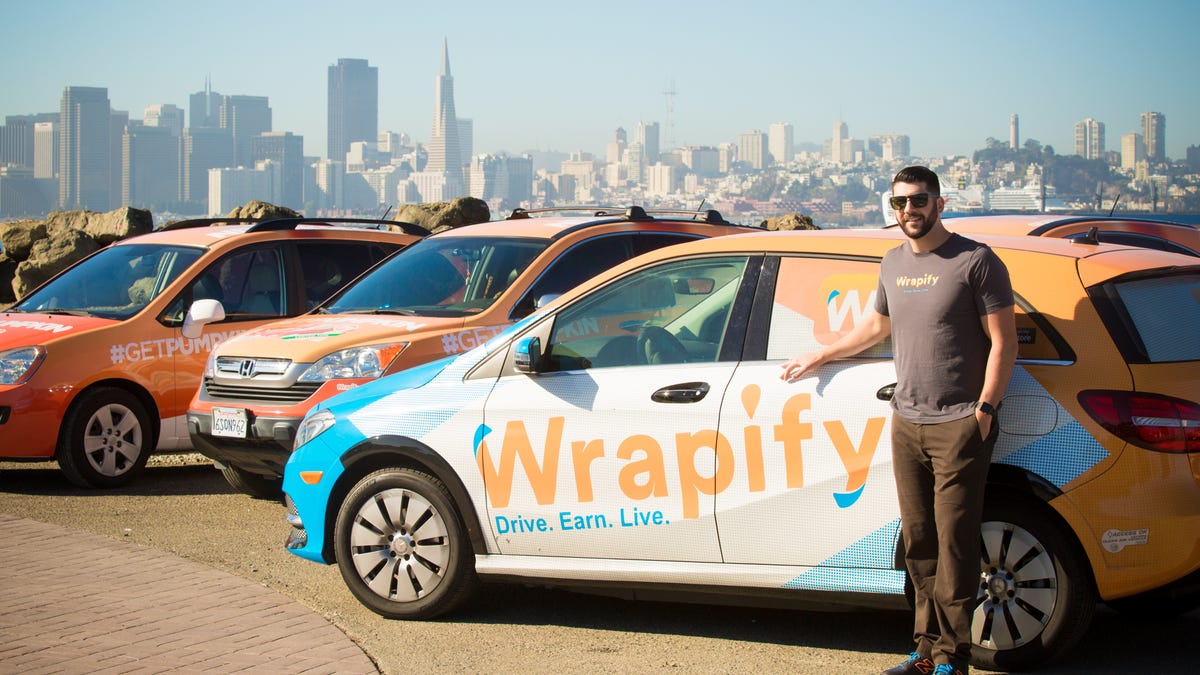Unicorns, ad-wrapped cars and other signs of a coming techpocalypse
Investor cash minted a new $1 billion startup every four days this fall. Analysts say that's "bonkers."
A symbol of the dot-com bust is back. Is it time to panic?
San Diego-based Wrapify recruits drivers and swathes their cars in vinyl advertisements, often for companies not much older than the 5-month-old startup. For the last few months, everyday commuters rolled along the streets of San Diego and San Francisco promoting young companies like security-camera firm Butterfleye, in-home caregiver HomeHero and viral-video site Unreel.co.
Sound familiar?
Wrapping cars in ads became popular as the first dot-com boom in the late 1990s gave way to bust. Honda Civics and Toyota Corollas were turned into roving billboards for, say, Yahoo.
"A lot of the money spent in the late 1990s during the dot-com boom was purely wasted," said Eric Goldman, a professor of Internet and advertising law at Santa Clara University, adding that the mania at small companies to show progress meant that family sedans emblazoned with corporate logos made sense. When the dot-com bust hit, demand for all that advertising collapsed. Ad-wrapped cars "went out the window," he said.
Skeptics wonder if the current tech boom, now in its fifth year, will end with a similar stomp on the brakes. The environment, as symbolized by Wrapify, feels unsustainable, they say. Recent IPOs of many tech companies have disappointed, even as investors have continued throwing gobs of cash at startups.
So far this year, venture capitalists and deep-pocketed institutional investors have spent $60 billion chasing the next Google or Facebook, according to research firm Pitchbook. That's one-third more than they spent on startups during the same period in 2014 and more than double the amount in that time frame in 2013.
Some of the investments reflect a "spray-and-pray" approach to venture capital, in which lots of companies get funded with the expectation most will fail. That, the VCs reckon, won't matter as long as a few are hits.
The flood of cash has also created a perfect breeding ground for unicorns, privately held startups worth a billion dollars or more.
The collision of cash, ego and some pretty good ideas has produced a few mega-companies. Ride-hailing giant Uber is valued at $51 billion. Home-sharing site Airbnb just nabbed another $1.5 billion from investors, who value the company at $25 billion. Snapchat, maker of a photo- and video-messaging app, is reportedly worth $16 billion.
During the third quarter of the year alone, investors created 23 new unicorns, or one every four days, and the herd population now totals 145, according to venture capital research firm CB Insights.
"That's kind of bonkers," said CB Insights CEO Anand Sanwal, referring to the exponential pace of unicorn growth.
Jeff Grabow, the soft-spoken head of Ernst & Young's US venture capital group, is hesitant to call the boom a bubble. However, he believes a slowdown will likely start in the next six to nine months.
"Cash will not be available at this rate," he said.
Already, the glow appears to be fading on some much-hyped startups.
Last month, hot payments startup Square went public at a value less than half of the $6 billion that private investors had pegged it at last year. The company, founded by Twitter CEO Jack Dorsey, lowered the share price it was willing to accept for its IPO to get new investors to buy in.
Similarly, Box, an online-storage company, went public in January at a 30 percent discount from the $2.4 billion it had earlier been valued at by private investors.
Then there's Lending Club. In the 12 months since the peer-to-peer credit marketplace went public, its value has shrunk 49 percent, dropping from $8.5 billion to $4.32 billion.
Roger Lee, a partner at Battery Ventures, found in a study that the performance of startup shares when listed on public markets has declined every year since 2010. That means venture capitalists, like Lee himself, aren't profiting as much when their investments go public.
It's "like a balloon slowly losing its air," Lee said of the situation, which he expects to be largely confined to VCs and institutional investors, like pension funds.
Wrapify's 28-year-old CEO, James Heller, said his car-advertising company will be able to survive a tech-driven slowdown because smartphones give its clients better insight into how effective the service is. In the past, Heller said, advertisers didn't know what they were paying for or how many people saw their messages.
Wrapify tracks how many miles car owners have driven via their iPhones and calculates what it will charge advertisers based on the route. The data is paired with real-time traffic data to give advertisers an estimate of how many drivers view their ads.
The smartphone has made auto advertising a science, or so the thinking goes.
"Before it was money being spent on wrapping cars," Heller said. "Praying and spraying."


